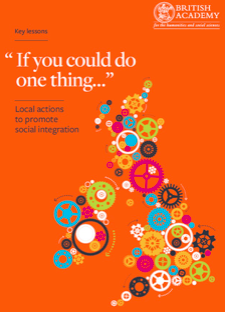The British Academy has published two reports: 10 Local actions to promote social integration and The integration of migrants, asylum seekers and refugees.
“If you could do one thing…”
Since January 2017, the British Academy has led a programme of work to examine local actions to improve social integration in the UK. “If you could do one thing…” Local actions to promote social integration highlights practical, evidence-based interventions which could be replicated in other parts of the country to improve relationships between communities of different ethnic backgrounds and to help new arrivals feel welcome.
Led by Professor Anthony Heath CBE FBA, and steered by a working group of experts from the Department of Communities and Local Government, the Local Government Association, the Equality and Human Rights Commission, the Challenge, Joseph Rowntree Foundation, and the University of Kent.
10 Local actions to promote social integration
The British Academy commissioned academics and practitioners to suggest local interventions which tackle the challenges of a diverse society, from a community arts festival to boost community connectedness in Ramsgate, to a lunch club run in Birmingham which offers a safe space for asylum seekers and refugees.
The integration of migrants, asylum seekers and refugees
These interventions are accompanied by a series of case studies of projects working with recently arrived migrants, asylum seekers and refugees, with a particular focus on young people. These include St Edmund’s Nursery School in Girlington, Bradford, which supports Roma and Central and Eastern European children and their parents, and the Baca project in the Midlands which provides alternative holistic care for unaccompanied asylum seeking children. The regional case studies were generously funded by the Paul Hamlyn Foundation.
Download the reports here
British Academy IYCDOT Key Lessons
British Academy IYCDOT Case Studies
Over a year on from Dame Louise Casey’s Review of social integration in the UK, the British Academy identifies some key lessons from the projects studied:
- Social integration is a two-way process. The most successful interventions offer something back to the existing community, whether that be the opportunity to make friends from different backgrounds or to take part in something creative.
- Involving members of migrant communities in the design and implementation of projects is important. Many of the initiatives train local ‘champions’ to help them deliver their services and act as ambassadors in their communities.
- Local authorities provide more than funding. Local authorities celebrated by many of the featured interventions often hosted forums to bring people together and had a good understanding of the role of partner organisations. They were seen as a positive body to galvanise people, and foster two-way communication with local stakeholders.
- Confronting and resolving tensions is vital. Dealing with local grievances not only helps to dissolve tensions, but also prevents these from undermining any effective social integration work already going on.











